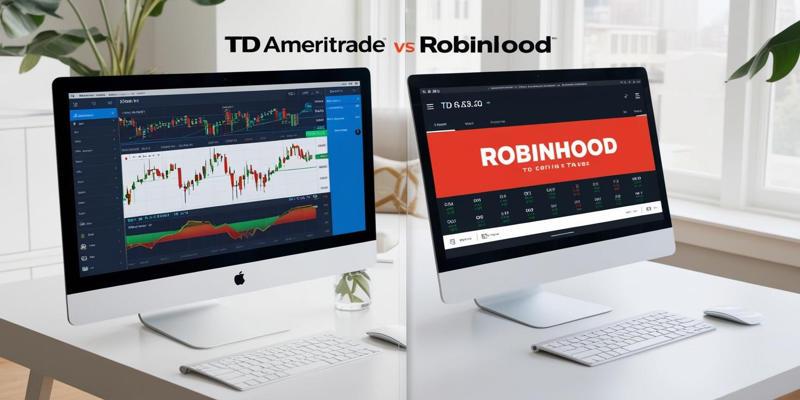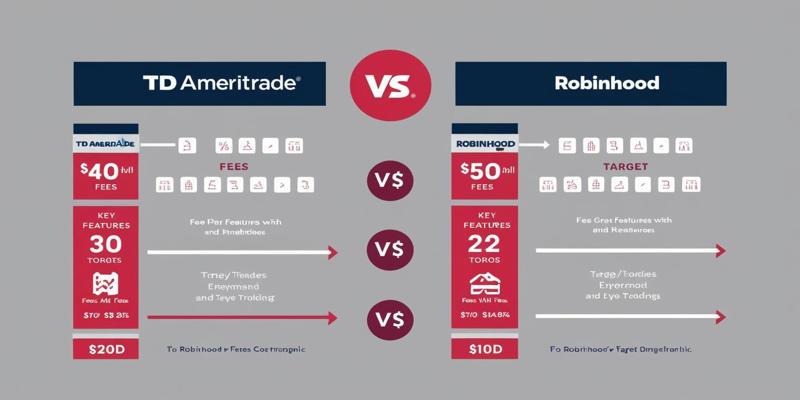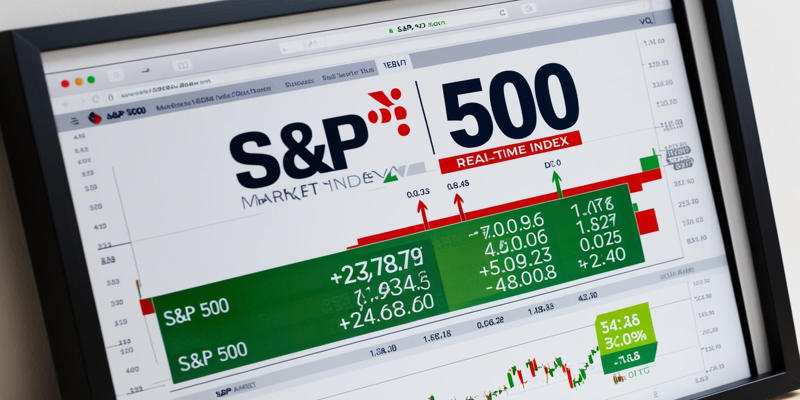Advertisement
The right brokerage choice can make all the difference in an investor's financial outcome. TD Ameritrade and Robinhood are two of the most popular choices. They differ in their respective features and cater to different kinds of traders. This in-depth comparison will help you better decide which one will best suit your investment needs.
 TD Ameritrade vs. Robinhood: when thinking about these two, a very different way of online investment comes to mind. Of course, both brokerages offer commission-free trading in stocks and ETFs, but they appeal to different kinds of investors with different needs and experience levels.
TD Ameritrade vs. Robinhood: when thinking about these two, a very different way of online investment comes to mind. Of course, both brokerages offer commission-free trading in stocks and ETFs, but they appeal to different kinds of investors with different needs and experience levels.
Investors of all experience levels, from beginners to advanced traders, have a certain love for TD Ameritrade. Its depth of educational resources and research tools makes it very good for those that need to dig deep into the analysis. On the other hand, Robinhood appeals to younger investors who are generally comfortable managing investment accounts and conducting financial affairs via their phones. It's an appealing, no-frills app for millennials and first-time investors because of its friendly UI and in-app gamification.
Both platforms have trading options and features that have zero commission stock and ETF trades. However, TD Ameritrade provides more classes of investments. While the stocks and ETFs are supported on the TD Ameritrade this platform supports options, mutual funds, bonds, forex, and futures. Robinhood is narrowly focused and currently offers stocks, ETFs, and options.
Thinkorswim - the TD Ameritrade trading platform - is really geared toward the active trader with advanced charting, real-time data, and professional order types. While it has been adding features at a rapid pace, Robinhood is designed to be more about ease of use and simplicity than full-fledged trading.
TD Ameritrade: For serious investors, events, webinars, articles, and other educational resources for various skill levels; very deep and wide research studies-access to third-party reports, screeners, and market analysis all available.
It is in this respect that Robinhood has been really working on education-but rather behind. It offers some fundamental data on investing, thin scraps of market news-nothing like the breadth or depth of TD Ameritrade's arsenal.
 Comparing TD Ameritrade versus Robinhood, much of your decision may rest on the trading platforms and overall user experience. Both firms have distinct features and interfaces that will attract different types of investors.
Comparing TD Ameritrade versus Robinhood, much of your decision may rest on the trading platforms and overall user experience. Both firms have distinct features and interfaces that will attract different types of investors.
For advanced trading, TD Ameritrade's flagship platform is Thinkorswim. This potent tool has advanced charting, real-time data, and sophisticated analytics. Advanced traders and investors will be hard-pressed to find this application's depth of features. The only potential issue is that beginners may take in a lot initially.
In addition to Thinkorswim, TD Ameritrade has a web-based platform and mobile app that are accessible across devices. The web platform is intuitive and balances its functions and ease of use well for beginners and intermediate traders.
Robinhood is sleek and very easy to use. The more minimalist design and intuitive navigation definitely resonate well with younger, tech-savvy investors. The mobile app is a mirror image of its web platform and hence is as effective for trading on the go.
As much as simplicity is a strong suit for Robinhood, that also can be a limitation to broader traders who want more tools and deep market analysis. The feature set of the platform is essential, and that may leave some wanting it.
TD Ameritrade provides more educational resources and research tools, enabling one to dig deeper and analyze more.
Robinhood is easier for a first-time investor to get into without being overwhelmed.
While both are free to trade stocks and ETFs, TD Ameritrade offers a wider suite of investments
When it comes to investing with these two brokers, TD Ameritrade and Robinhood, the investments that each brokerage offers and the types of accounts are among the most important aspects of deciding which one is right for you. After all, these will significantly affect your investment strategy and long-term financial goals.
TD Ameritrade offers a range of investment products for the needs of various investors, from the beginning investor to the established investor. These include but are not limited to:
Robinhood, on the other hand, is much more streamlined. You can trade stocks, ETFs, options, but you won't be able to trade mutual funds, bonds, or forex.
In particular, the following TD Ameritrade accounts are available:
Robinhood mainly offers individual taxable accounts and IRAs. With very few account options, few account types or date-specific goals will find the perfect account offering for every investor.
Fractional share investing is also supported on both: You can buy partial shares of stocks that would be otherwise expensive. This democratizes access to premium stocks and allows for a finer level of granularity when allocating portfolios. Robinhood offers an automatic dividend reinvestment plan that will multiply your money over time. DRIP is allowed at TD Ameritrade, but dividend investors love the extra functionality that becomes available.
When considering the services of TD Ameritrade versus Robinhood, the price for those services is always the first consideration. Both firms have slashed costs considerably over the years to allow for pricing to be as competitive as possible. Key differences exist in a number of areas, however.
There are no commissions for trading stocks and ETFs listed on US exchanges with either TD Ameritrade or Robinhood. That means no per-trade fee on such securities, which are essential both to active traders and beginning investors.
With that in mind, it is worth noting that while Robinhood has always been commission-free, TD Ameritrade only recently cut its commissions on stock and ETF trades back in October of 2019-a move made largely in response to competitive pressures applied by newer platforms such as Robinhood.
Both offer commission-free trades in options. However, TD Ameritrade charges a $0.65 per contract fee, while Robinhood doesn't charge any per-contract fees. Because of this, Robinhood is more appealing to those who actively trade options or who have to deal with several contracts.
While these platforms are commission-free in trading, there are a few other fees to look out for:
Each has distinct strengths for different investor types. Ultimately, TD Ameritrade has superior research tools, education, and tailored support for advanced traders who like intricate analysis. At the same time, Robinhood provides a warm welcome through its mobile application and commission-free trades, probably becoming more attractive for new investors just starting with it. It means considering investment goals, experience levels, and trading style upon making a choice between such platforms. By weighing all these positives and negatives against each other from the comparison made above, you can identify which among them best fits your financial requirements and goals.
Advertisement

By Darnell Malan/Dec 15, 2024

By Vicky Louisa/Dec 27, 2024

By Aldrich Acheson/Oct 31, 2024

By Martina Wlison/Oct 18, 2024

By Martina Wlison/Dec 26, 2024

By Madison Evans/Oct 12, 2024

By Korin Kashtan/Dec 26, 2024

By Mason Garvey/Jan 01, 2025

By Darnell Malan/Dec 25, 2024

By Sid Leonard/Nov 10, 2024

By Vicky Louisa/Dec 15, 2024

By Georgia Vincent/Nov 05, 2024